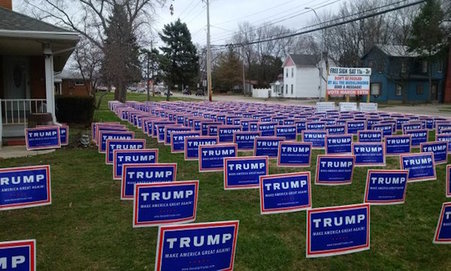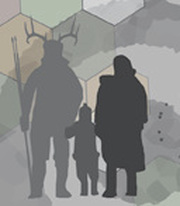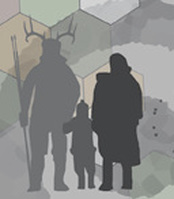Many of my friends, like me, will go to work and teach today. I'm betting that very few, if any, really want to do it. I know I didn't. But while I was getting the kids ready for school and trying to wrap my head around what all this means, I was somewhat surprised to realize that Donald Trump's victory last night has served to stiffen my resolve about being a good educator. I know that this is a frustrating moment (and, for some, a very frightening moment), but this is not a time to shrink away.
I'm going to talk more, not less, about race and the history of race in the United States.
I'm going to talk more, not less, about critical thinking and the process of discriminating credible from non-credible explanations.
I'm going to talk more, not less, about the importance of constructing evidence-based understandings of the way the world works.
 The yard of a motivated rural voter.
The yard of a motivated rural voter. I teach at a major university in the state where the Civil War began. I teach a mostly white undergraduate student body (African American enrollment at USC Columbia is about 10%, significantly lower than percentage of the population in the state). That's my audience. My goal is not to get my students to think what I think, but to help them develop the tools they need to understand the realities of a complex world, to understand why our interpretations of the past are relevant to societies today, and to be able to independently discern when they are being fed a load of baloney.
Jason Colavito's post this morning discussed the parallels between "fringe" history and the growth of the culture that elected Donald Trump. He's right, and there are an amazing number of deep and disturbing parallels. My wife could attest to the number of times I said "I've seen this before" while watching Donald Trump spin a lie, dodge a question, or double down on the conspiracy card. The levels of conspiratorial thinking that blanket "fringe" history are startling similar to those that are present when you delve into the thoughts of some Trump supporters. It's frightening.
And it's not something we can just responsibly choose to not talk about because it's not pleasant. Race still matters in this county. The sources of ideas still matter in this country. Agreeing to attempt to understand and live in a reality together still matter in this country.
Dr. Henrik Williams, a world-renowned runologist, joined my Forbidden Archaeology class this morning via Skype to talk about the Kensington Rune Stone. After what happened last night, it seemed strange to be discussing the details of a rock with some carvings on it -- most people in the world have probably never heard of it and only a very few of those who have probably really care if it's an authentic medieval artifact or not. So why are we talking about it? For the students, it's not a conclusion about the rock that's important (nothing changes for them tomorrow whether or not the Kensington Rune Stone is real or fake) but understanding the process of how you determine whether something is real or fake. I think that's a skill set that was severely underemployed during this last election cycle.
As educators, we need to fight harder than ever to give students the knowledge, confidence, and skills they need to seek, produce, and insist upon maintaining a world with some objective realities.
We have the ability to be constructive and not just angry. To quote Tim Kaine quoting William Faulkner: "they kilt us but they ain't whupped us."
And now it's back to work.


 RSS Feed
RSS Feed
